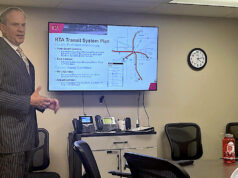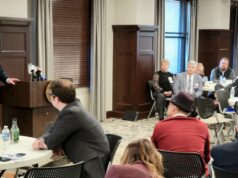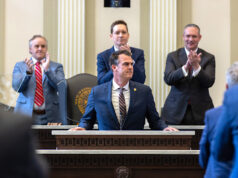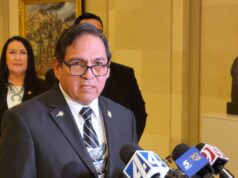Incumbent Republican Gov. Kevin Stitt, Democratic nominee Joy Hofmeister, independent Ervin Yen and Libertarian Natalie Bruno make up the 2022 field running for governor in Oklahoma.
Stitt holds a three-point lead over Hofmeister, according to a recent poll by Amber Integrated and KOCO. Bruno and Yen were at 2 percent and 1 percent, respectively, in the poll.
In an effort to provide more information about Yen and Bruno, NonDoc has offered to conduct video interviews with each candidate.
NonDoc and News 9 are hosting a debate between Stitt and Hofmeister on Oct. 19. Owing to polling results and time limitations, the debate will only feature Stitt and Hofmeister.
The video embedded above features a half-hour interview with Natalie Bruno about her background, beliefs and campaign.
Stitt job performance inspired run
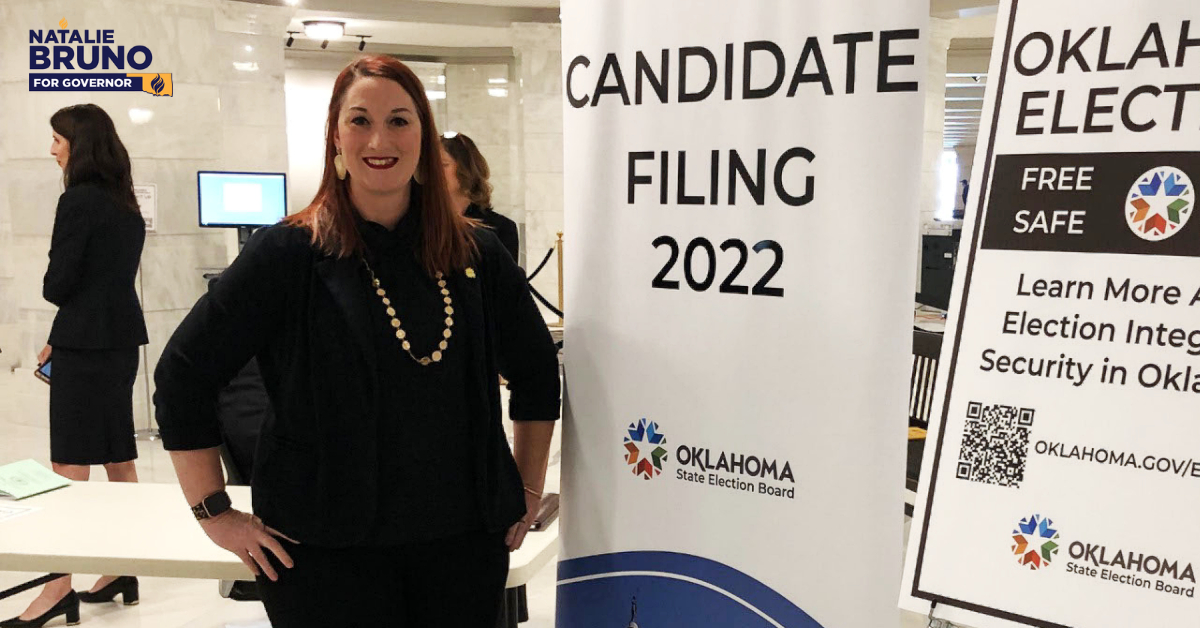
Born in Lawton, Bruno lived in several states while growing up in a military family. Since moving back to Oklahoma following her high school graduation, Bruno has married and has raised six kids in a blended family with her husband. Bruno has also volunteered for several nonprofits while working in marketing and advertising for her career.
Bruno said the COVID-19 pandemic and Stitt’s performance on the job were the primary drivers in her decision to run for governor, something she said she had not previously considered.
“Ever since COVID, Oklahomans have more awareness about their personal freedoms, and lack of personal freedoms,” Bruno said in the interview embedded above. “And it was a mixture between that and the obvious unhappiness with the way Stitt has been running the state of Oklahoma that I realized there was a really great opportunity for the right candidate, for the Libertarian Party, to make some waves and to make some great progress in this state.”
‘Don’t hurt people and don’t take their stuff’
Bruno said she became a Libertarian five years ago. During her high school years, she registered as an independent before becoming a Democrat and then a Republican later in life.
Bruno said a friend steered her toward libertarianism. Like any political party, she said, the Libertarian Party also has those who are extreme in their beliefs and those with more moderate views. She described herself as a conservative within the party.
“In simplest terms, it’s about keeping government as small and as local as possible,” she said. “Don’t hurt people and don’t take their stuff. Really, in the simplest terms, that’s it.”
Bruno said she understands eliminating taxes entirely is not realistic, but she said she would like to eliminate the Oklahoma income tax, as well as the sales tax on groceries.
“For me it’s about not taking excess tax dollars and being smarter,” she said. “If we’re going to be taking people’s tax dollars we should be using them as efficiently as possible. We have a tendency to abuse those dollars and not spend them efficiently. I would love to go through and change our bidding systems. Change the way we do our budgeting. As we’ve seen with the Swadley’s incident, that is not an isolated problem. Things like that happen with taxpayer dollars all the time.”
Bruno also said she generally opposes the state accepting federal money for education. Federal funds pay for things like school feeding programs, special education services and some reading programs. Bruno said while the allure of federal money is obvious, sometimes it is better not to take those funds.
“Whenever we receive any federal money or grants, there are always stipulations with it,” she said. “For example, fi we apply for a grant for federal funding and they say we’re going to give you a million dollars but X amount of dollars has to go toward technology, X amount has to go toward a building, a certain percentage has to go toward this. And they tell you exactly how to spend that money. So what typically happens is we end up spending money in areas that we really don’t need to just to meet their criteria, and we sometimes don’t get as much money as we need in others.”
Bruno said Tobacco Settlement Endowment Trust money could be used to provide free lunches to low-income kids, rather than having the state take federal dollars.
“Just because we’re not taking federal dollars doesn’t mean we need to abandon programs that money is going to,” she said. “It means we’re choosing to pull that money from other areas.”
For more on Bruno and her policy plans if elected, watch the video linked above and visit her campaign website.










